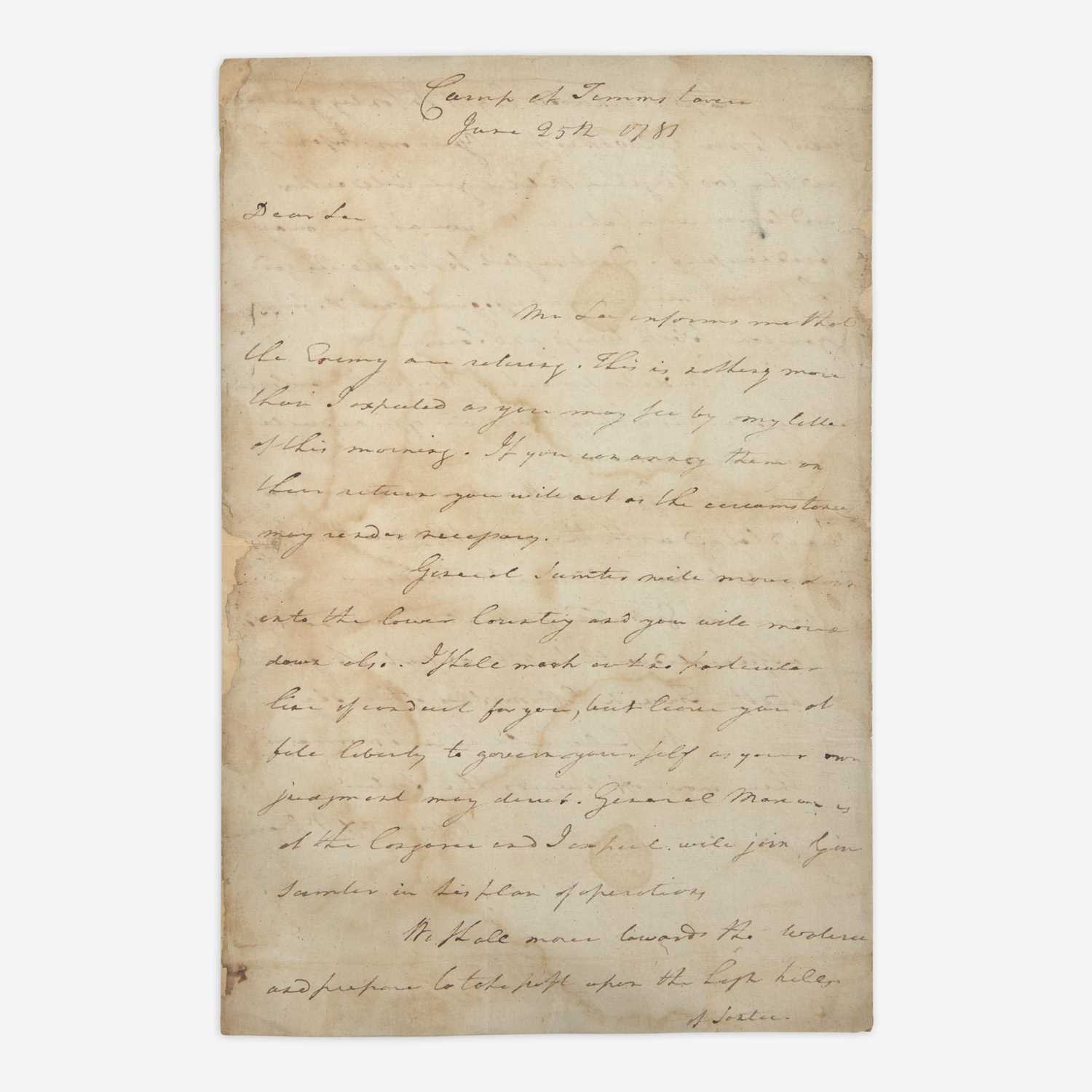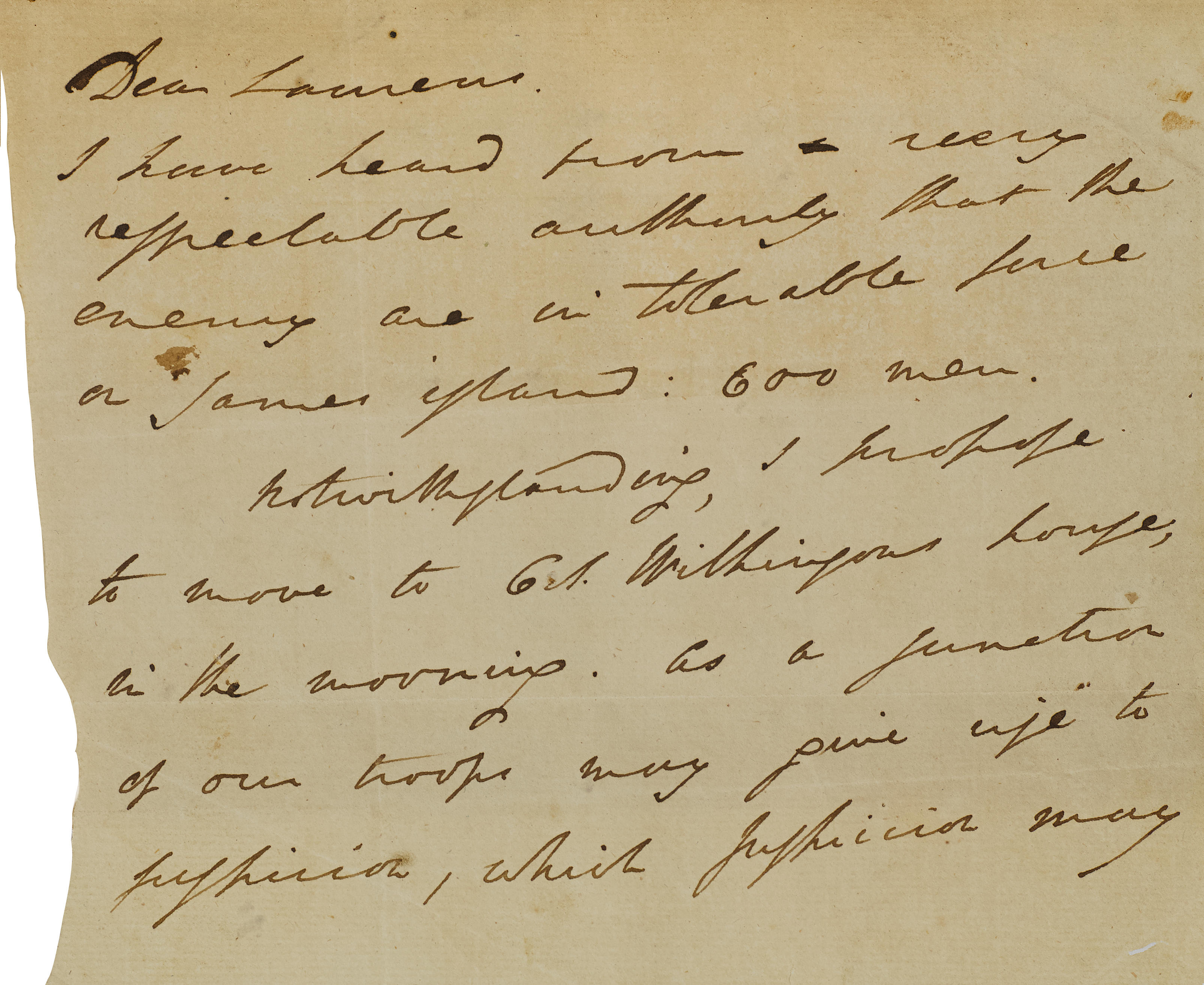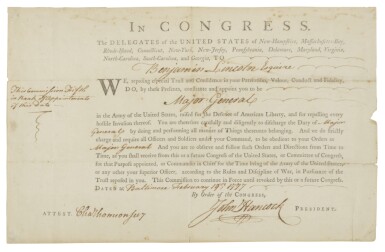AMERICAN REVOLUTION -- SOUTHERN THEATER, BATTLE OF HOBKIRK'S HILL]. MATHIS, Samuel. Autograph manuscript signed ("Samuel Mathis"), an account of the Battle of Hobkirk's Hill, 25 April 1781, in a letter (no salutation) to General W.R. Davie, 26 June 1819. 14 pages, folio, cover sheet docketed by Davie, versos discreetly silked, green morocco gilt-lettered. "ONLY ONE WORD, A SINGLE WORD, TURNED THE FATE OF THE DAY." Mathis, of Camden, S.C., collected accounts of the Battle of Hobkirk's Hill from British and American participants immediately after the event. First published in American Historical Review , 2:106-109, Mathis's vivid narrative is excerpted in H.S. Commager & R.B. Morris, Spirit of Seventy-Six , pp.1177-1178 and elsewhere, and is a principal source in most accounts of this historic battle (see Boatner, for example). Mathis describes the field of battle, just outside Camden, S.C., occupied by British troops under Lord Rawdon, and the approach of the American force under General Nathanael Greene. Greene's units and commanders are enumerated by Mathis. "Two strong pickets were placed in front of the Army but the Woods were so thick that a man could not be seen at 100 yards at noon day." On the night of April 24, an American deserter revealed to Rawdon the American dispositions. Rawdon turned his lines over to "Negroes and Tories," and marched his main army of regulars "in a most silent and secret manner" in a flank attack on the American encampment. His columns were fortuitously discovered early on the morning of 25 April. "Kirkwood's Muskets gave the first alarm to the Americans, several of whom were at the Spring cooking & washing, and had to run a considerable distance before they got to their Arms." Initially, the British "succeeded in turning our left," but Greene's artillery "opened up on them a well directed fire with Canister and Grape." Cavalry under William A. Washington "completed the Rout of the York Volunteers, took all the British Doctrs. & Surgeons and a great many others (alas too many) Prisoners. More than one third of Washington's men were incumbered with Prisoners." To this point "the Battle was equal or rather in our favour and only one Word, a single Word turned the fate of the Day." According to Mathis, Rawdon himself faced capture, and the Maryland Continentals under Gunby were ordered to charge without firing. Then Gunby ordered the center to "halt." This was the fatal command: "before the Col. could be understood the Enemy were in among them and made them give way. Ld. Rawdon was surrounded near the head of this Regt. & saw the Scene while he was politely bowing & seemed to acquiesce pretending that his sword was hard to get out of the Scabbard for the surrender required, until the [American] party that took him were attacked & had to fly." The American attack quickly disintegrated, "Washington's Dragoons were now attacked," and Greene "now ordered a Retreat." At the end Mathis identifies his sources, stating that "a number of the American Officers were quartered" in Mathis's home as were several Americans and wounded British officers after the battle. "...It was from these Officers, Doctors, Capt. Smith, the wounded Soldiers of both Parties, the British officers after the Battle several of the Inhabitants and several of Genl. Greene's Officers...that I rec'd. my information." Provenance : Walter R. Benjamin Autographs, in 1946--Robert C. Norton, Cleveland, Ohio--The present owner.
AMERICAN REVOLUTION -- SOUTHERN THEATER, BATTLE OF HOBKIRK'S HILL]. MATHIS, Samuel. Autograph manuscript signed ("Samuel Mathis"), an account of the Battle of Hobkirk's Hill, 25 April 1781, in a letter (no salutation) to General W.R. Davie, 26 June 1819. 14 pages, folio, cover sheet docketed by Davie, versos discreetly silked, green morocco gilt-lettered. "ONLY ONE WORD, A SINGLE WORD, TURNED THE FATE OF THE DAY." Mathis, of Camden, S.C., collected accounts of the Battle of Hobkirk's Hill from British and American participants immediately after the event. First published in American Historical Review , 2:106-109, Mathis's vivid narrative is excerpted in H.S. Commager & R.B. Morris, Spirit of Seventy-Six , pp.1177-1178 and elsewhere, and is a principal source in most accounts of this historic battle (see Boatner, for example). Mathis describes the field of battle, just outside Camden, S.C., occupied by British troops under Lord Rawdon, and the approach of the American force under General Nathanael Greene. Greene's units and commanders are enumerated by Mathis. "Two strong pickets were placed in front of the Army but the Woods were so thick that a man could not be seen at 100 yards at noon day." On the night of April 24, an American deserter revealed to Rawdon the American dispositions. Rawdon turned his lines over to "Negroes and Tories," and marched his main army of regulars "in a most silent and secret manner" in a flank attack on the American encampment. His columns were fortuitously discovered early on the morning of 25 April. "Kirkwood's Muskets gave the first alarm to the Americans, several of whom were at the Spring cooking & washing, and had to run a considerable distance before they got to their Arms." Initially, the British "succeeded in turning our left," but Greene's artillery "opened up on them a well directed fire with Canister and Grape." Cavalry under William A. Washington "completed the Rout of the York Volunteers, took all the British Doctrs. & Surgeons and a great many others (alas too many) Prisoners. More than one third of Washington's men were incumbered with Prisoners." To this point "the Battle was equal or rather in our favour and only one Word, a single Word turned the fate of the Day." According to Mathis, Rawdon himself faced capture, and the Maryland Continentals under Gunby were ordered to charge without firing. Then Gunby ordered the center to "halt." This was the fatal command: "before the Col. could be understood the Enemy were in among them and made them give way. Ld. Rawdon was surrounded near the head of this Regt. & saw the Scene while he was politely bowing & seemed to acquiesce pretending that his sword was hard to get out of the Scabbard for the surrender required, until the [American] party that took him were attacked & had to fly." The American attack quickly disintegrated, "Washington's Dragoons were now attacked," and Greene "now ordered a Retreat." At the end Mathis identifies his sources, stating that "a number of the American Officers were quartered" in Mathis's home as were several Americans and wounded British officers after the battle. "...It was from these Officers, Doctors, Capt. Smith, the wounded Soldiers of both Parties, the British officers after the Battle several of the Inhabitants and several of Genl. Greene's Officers...that I rec'd. my information." Provenance : Walter R. Benjamin Autographs, in 1946--Robert C. Norton, Cleveland, Ohio--The present owner.










Testen Sie LotSearch und seine Premium-Features 7 Tage - ohne Kosten!
Lassen Sie sich automatisch über neue Objekte in kommenden Auktionen benachrichtigen.
Suchauftrag anlegen